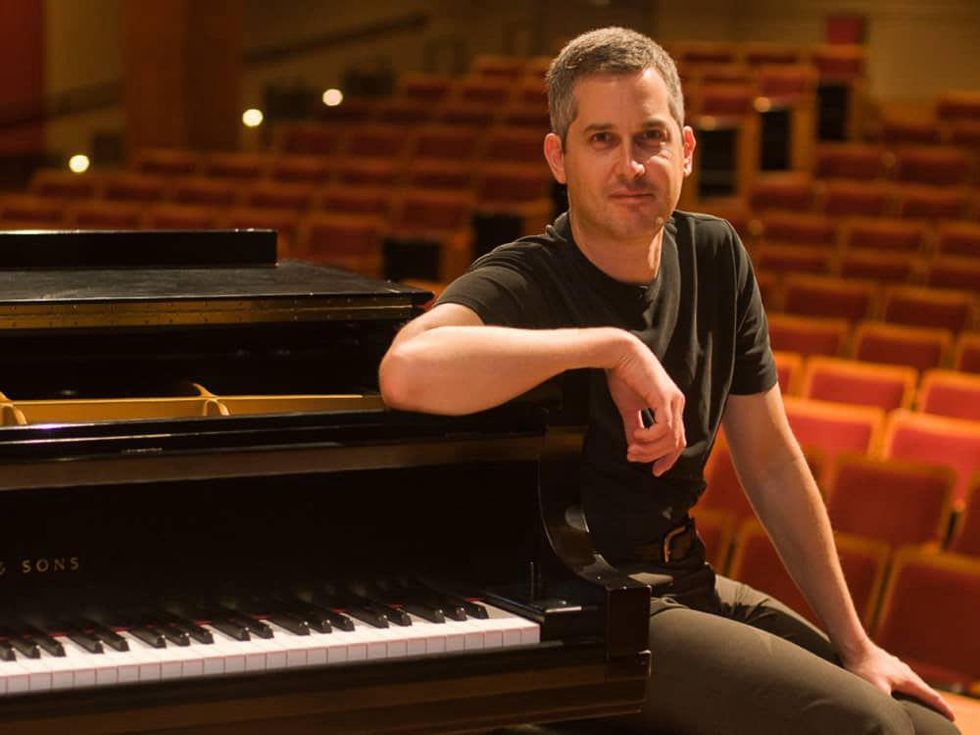Word Play
What If questions that haunt relationships: Who you ended up with becomes a Musiqa Sphinx
Oh, if cars could talk . . .
Think about the teenage shenanigans. Think about the road trips. And think about the many personal conversations. Because whatever happens inside the car, stays in the car — so we hope.
That's where San Antonio-native Jennifer Haley's one-act play, Sphinx, begins. The 2012 Susan Smith Blackburn Prize winner's oeuvre will premiere in Musiqa's "Word Play" concert, set for 7:30 p.m. Saturday at the Hobby Center for the Performing Arts.
The play: Riddles, truth and unity
Meet the protagonists Melody and Martin, a couple that falls in love inside of such car at age 19. Haley returns to this familiar setting to revisit the twosome at different stages of life — in their thirties, fifties and sixties.
"The premise of dropping in on their evolving relationship at different moments in their lives explores the idea that once a decision is made, there's a path taken and one that isn't," Haley says. "That choice incites a universal question common to the human experience: What if."
What if you would've turn right instead of left? What if you would've ordered the low calorie salad instead of the bacon double cheese burger? And arguably the most significant question, what if you would've married that one instead of this one?
"Sphinx is about the process of coming to peace with this inevitable cycle of uncertainty."
"Every decision has a consequence," she continues. "But at the end, there's no redos. There's no opportunity to know for sure the outcome of both paths when you encounter the fork on the road."
Haley intended for Sphinx — regarded as a symbol of mysteries, riddles, truth, unity and secrets, as a portal to clarity — to be a strong commentary on love and relationships. More specifically, she magnifies the doubts that loom over a person's resolution to follow their heart, and the subsequent individual changes and compromises that surface because of that.
"It isn't anti-marriage or anti-relationships by any means," she clarifies. "Sphinx is about the process of coming to peace with this inevitable cycle of uncertainty."
Haley, who's based in Los Angeles, won the Blackburn Prize for The Nether, which is currently being presented by the Center Theatre Group in Los Angeles through April 14. Her work has been descried as "ingenious mindf**k" by the Hollywood Reporter and as "a tale that entertains while tickling the brain."
Haley's commissioned script adds to a larger celebration of the 35th anniversary of the Blackburn Prize, which awards 10 women playwrights in Houston, New York and London a total of $50,000 annually. Participating organizations that will stage productions by the foundation's recipients include the Alley Theatre, Stages Repertory Theatre, Main Street Theater, Stark Naked Theatre, The Ensemble Theatre, Theatre Southwest, The University of Houston and Sam Houston State University.
Music and theater
Musiqa wanted an invitation to the party, but was faced with a conundrum: Does theater belong in a contemporary classical music program?
It surely fits for Musiqa. The collaboration between contemporary music and theater is part of the presenter's efforts to bridge across artistic genres to offer a holistic approach to aesthetic experiences. Moreover, Musiqa co-founder and artistic director Anthony K. Brandt wrote "incidental" music — for a lack of a more accurate term — to accompany the text.
"Without the music, Sphinx wouldn't convey the same message."
The challenge for Brandt was that unlike musical theater or opera, in which music typically slows down plot development in favor of dramatic prowess, the pace in traditional theater isn't determined by the notes on the staff. The verse moves independently from the music. Exactly synchronizing one with the other isn't necessary, desirable or even possible to achieve.
Brandt's scoring was an experiment of sorts.
"I wrote the music almost like a suite of separate but related fragments," Brandt explains. "I wanted to give the director (Leslie Swackhamer) the flexibility to align these snippets where and when they fit best."
In essence, Brandt found it necessary to let go of artistic control.
"I wanted it to be a play with music such that you wouldn't think of performing it without the score," he says. "The music builds on the story. Without the music, Sphinx wouldn't convey the same message."
Brandt's instrumentation calls for saxophone, clarinet, piano and string trio. A discernible jazzy theme serves as the foundation whose modulations and transformations echoes the couple's life journey.
"Sometimes I call for full fledged thick textures, and at other times I have to freeze and sustain so the sonorities don't obscure the words," Brandt continues. "But even when the theme is in its most fragile state, reduced to a skeleton version of itself, it's never generic.
"It's not mood music. It's motivically developed"
It's not music for the theater. It's music intertwined within the genre of theater.
There's a difference.
Also on the "Word Play" program are the world premiere of Rob Smith's String Trio "Las Pilas," Karim Al-Zand's Quelques Fleurs, Roshanne Etezady's Mother-of-Pearl and a new composition by Dutch avant-pop composer JacobTV.
___
Musiqa presents "Word Play" on Saturday, 7:30 p.m., at the Hobby Center for the Performing Arts. Tickets start at $20, $10 for seniors and students with ID, and can be purchased online or by calling 713-315-2525.




